Granger strives to strengthen pipeline of research talent, research infrastructure
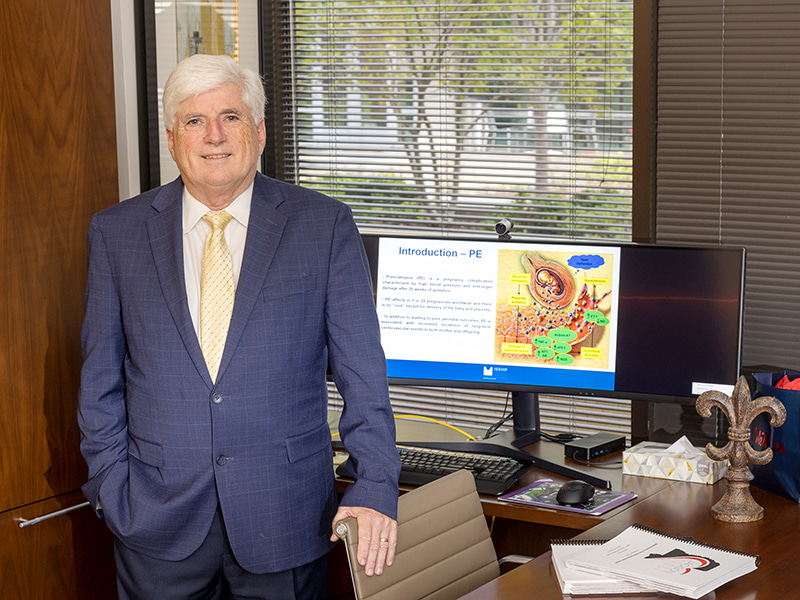
When Dr. Joey Granger accepted the role of associate vice chancellor for research this summer, he was adding a seventh position to his current cache at the University of Mississippi Medical Center.
He’s also Billy S. Guyton Distinguished Professor, the highest faculty rank at UMMC; dean of the School of Graduate Studies in the Health Sciences; professor of physiology and medicine; and director of three programs: Cardiovascular-Renal Research Center; Center for Clinical and Translational Research; and Hypertension and Cardiorenal Disease Training Program.
A 32-year faculty member at UMMC, Granger says the workload isn’t as bad as it seems since there’s a lot of overlap, he has a good team that helps run the multiple ships and he loves what he does.
“It’s not something I thought about doing,” he said of his newest role. “But the institution has been good to me. I got my training here, I came back and developed my research career here and I was glad to step into this role to give back to the institution that’s been good to me.
“Sometimes I utilize the fact that I have all of those positions to achieve certain goals,” said Granger. “I love going into a situation and improving things. I like identifying problems and coming up with solutions. And I enjoy working with other people and bringing people together.”
In his new appointment, Granger’s responsibilities include leadership of the Medical Center’s discovery enterprise, guiding the basic, clinical and population science research programs.
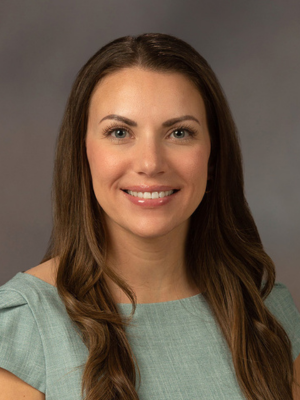
Dr. Leslie Musshafen, executive director of research who works closely with Granger, said he is an energetic, solutions-oriented leader.
“He clearly sees a goal, the path to achieve it and how to inspire others to work towards the same objective,” said Musshafen. “He doesn’t deny problems exist when they do, but he also doesn’t waste time dwelling on them. He challenges anyone who sets about the latter.”
Granger has specific goals in mind as he wraps up his first quarter as ASV.
“I want to solidify the basic science component and use that to build our clinical and population research programs,” he said. “I want to make sure we provide all the necessary tools for our research faculty to succeed, starting with making sure they have the right institutional and departmental cores, a stimulating intellectual environment with a critical mass of researchers, and bringing in new people that are given the tools to succeed.”
Recruiting clinician scientists can be a daunting task because there just aren’t that many of them, Granger said. So he decided the Medical Center should build its own.
“We’re building a pipeline,” he said. “We bring them in as undergraduate students and mentor them. We bring them during medical school and give them experience during their first and second year.”
The pipeline also requires innovation. The Medical Center does a great job of training researchers in programs like the MD/PhD, for example. The problem is, when those students complete training in seven years, most leave to complete fellowships and residences at other medical centers and never return.
“Right now, what I’m trying to do is get some of these people back, those that are finishing up their residencies and fellowships. Bring them back here because we’ve put a lot of resources into them.”
That’s why Granger is excited about the Residency PhD program, in which students get their residency training first and earn their doctorates on the back end. Degrees in hands, the Medical Center can hire them as faculty members, reaping the benefits of its investment, a model similar to the postdoctoral training for basic scientists.
“It’s important that all areas of research grow here,” he said. “Medical research to our institution is critical because it’s what makes us an academic medical center and what separates us from any other hospital in the state. Not only do you have the payoffs, new knowledge and new discoveries that hopefully can be translated not only in our hospital but throughout the state of Mississippi, I think having research strengthens our educational mission, also having the experts in their areas teaching our students with the latest knowledge.”
He will achieve those goals by using the Medical Center’s expertise.
“We’ve got excellent facilities, both the hospital and research laboratories,” said Granger. “Now we’ve got to make sure we’ve got the right people. We’ve got the bus; we’ve got to get the right people on the bus and provide them the right tools to succeed.”
The eighth of 11 children, Granger first came to UMMC as the younger sibling of two brothers who also earned their doctorates in physiology here, training in the same department under Dr. Arthur Guyton, whose father was former dean of the medical school and for whom Granger’s distinguished professorship is named.
“I recall coming here in the seventh grade and spending a week in the lab with my older brother,” said Granger. “And then when I was an undergraduate, when my second brother was going through grad school here, I spent the whole summer in the lab. And of course with that exposure and that experience, I became interested in biomedical research.”
Years later, as dean of the graduate school, he reflected on how that summer at UMMC impacted his career, creating a 10-week summer undergraduate research experience, which usually welcomes about 70 college students to campus.
A native of Erath, Louisiana – just 10 miles from where Tabasco sauce is made -- he had already earned a bachelor’s in biology from University of Louisiana before coming to UMMC for his PhD, after which he spent three years at the Mayo Clinic as a National Institutes of Health trainee and later, an assistant professor of physiology and biophysics. From there, he became assistant professor at Eastern Virginia Medical School and two years later, associate professor.
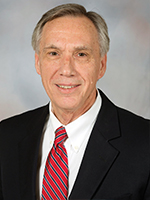
After four years in Virginia, Granger received a call from Dr. John Hall, who had been his mentor during his doctoral training, now an Arthur C. Guyton Professor and Chair of the Department of Physiology and Biophysics.
“Dr. Granger was the first new faculty member who I recruited after becoming chair and this was certainly a fortunate choice for us and, we hope, for him,” said Hall. “His contributions to UMMC and to the international scientific community as a teacher, mentor, researcher and leader have been extraordinary.”
A prolific researcher, Granger has brought more than $50 million in extramural funding to the Medical Center and published more than 300 manuscripts, which have been cited more than 24,000 times.
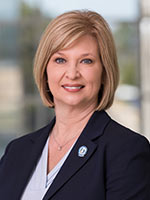
“Through Dr. Granger’s decades of service to the Medical Center, he has brought national and international acclaim to our research enterprise,” said Dr. LouAnn Woodward, vice chancellor for health affairs. “I look forward to his continued leadership as we embark on the next phase of our discovery mission.”
His primary research interest is pregnancy-related hypertension and preeclampsia, which he’s studied for 20 years, establishing one of the largest groups of preeclampsia-focused basic scientists in the country and garnering a number of national and international honors, including being named president of the American Physiological Society, chair of the American Heart Association’s Council on Hypertension, and recipient of this year’s AHA Excellence Award for Hypertension Research, the top award in the field.
That research expertise has helped mold and inspire the next generations of scientists.
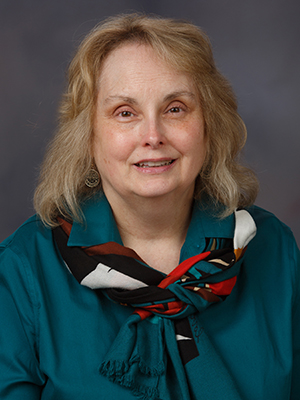
“Dr. Granger was instrumental in my training as a physiologist and a scientist during my post-doctoral years,” said Dr. Barbara Alexander, Billy S. Guyton Distinguished Professor of physiology and biophysics, who nominated him for the hypertension award. “His encouragement and support as I established my independent area of research were invaluable, and I am still very fortunate to consider him as one of my mentors.”
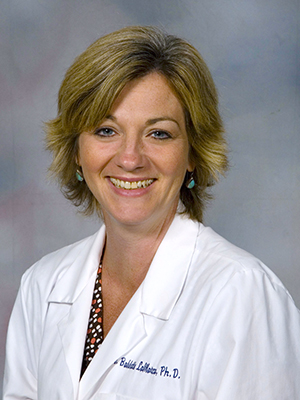
Dr. Babbette LaMarca, chair of pharmacology and toxicology, is another former student who still considers Granger a mentor. His “caring and jovial” personality and innovativeness as an educator make training in his lab fun, she said, helping students absorb the material.
When LaMarca was a postdoctoral fellow after earning a PhD in microbiology and immunology, Granger made sure her lack of physiology training didn’t hold her back.
“He spent many hours teaching me renal and cardiovascular physiology out of the Guyton and Hall textbook,” said LaMarca. “We went through these chapters each week, not once but twice, maybe even three times, so that I would have a strong foundation.”
When he’s not working, Granger simply likes “being with my wife Linda.” Married 46 years, they met in third grade when she sat in front of him in class. He remembers passing a note that asked, “Do you like me? Yes or no.” When she passed it back, she’d written, “Maybe.”
He likes to remind his wife that it took her seven years to say yes. In tenth grade, they started dating, attended college together, and married their sophomore year during Labor Day weekend. The wedding planning went like this: He went to his bachelor party Thursday night, attended class the next morning from 8 a.m. until noon, stopped on the way home to buy a few things for the reception, drove to the reception hall, got married that night, went on a three-day honeymoon, and was back to class Tuesday morning at 8.
Now a father to three and grandfather to six, he enjoys traveling with the entire family to Orange Beach, Alabama and to Europe with his wife, watching college football and World War II movies, and cooking up Cajun recipes, his specialty at the graduate school’s annual Holiday Open House and Appreciation luncheon.
Despite having seven jobs, Granger said his colleagues might be surprised to know he’s not a workaholic; he enjoys time with family just as much as being at work, living by the Cajun motto: Work hard and play hard.


